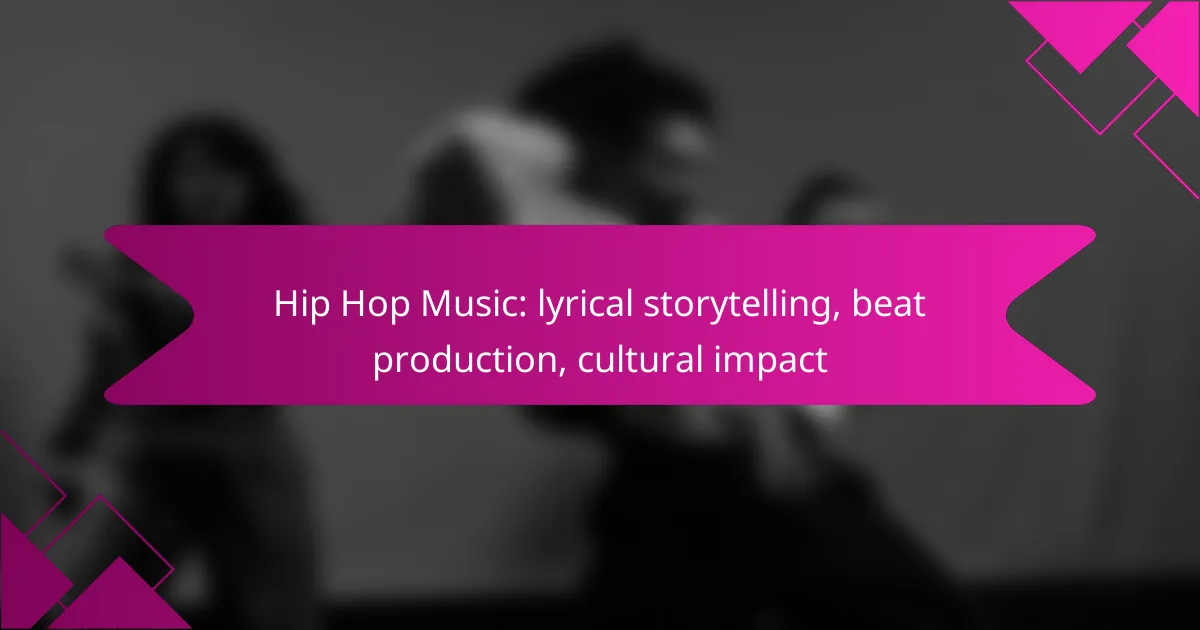Hip hop music is a dynamic genre that combines lyrical storytelling with innovative beat production, allowing artists to share their personal narratives and social insights. Through intricate rhythms and melodies, hip hop not only entertains but also serves as a powerful cultural force, shaping fashion, language, and social movements in urban communities worldwide.
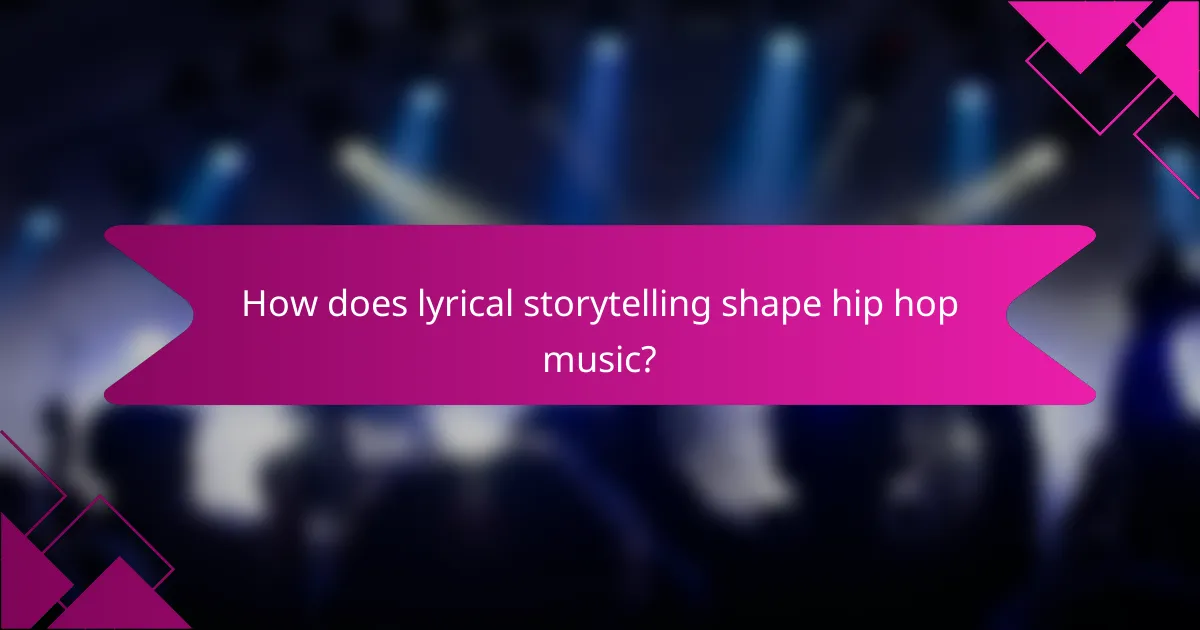
How does lyrical storytelling shape hip hop music?
Lyrical storytelling is a fundamental aspect of hip hop music, providing depth and context to the genre. It allows artists to convey personal experiences, emotions, and social commentary, creating a powerful connection with listeners.
Emotional connection through narratives
Emotional narratives in hip hop engage listeners on a personal level, often evoking feelings of empathy and understanding. Artists use storytelling to share their struggles, triumphs, and vulnerabilities, making their music relatable and impactful.
For instance, tracks that recount personal hardships or moments of joy can resonate deeply with fans, fostering a sense of community and shared experience. This emotional connection is a key reason why hip hop remains a powerful medium for expression.
Influence of personal experiences
Personal experiences serve as rich sources of inspiration for hip hop artists, shaping their lyrics and overall sound. Many songs draw from the artist’s life, including their upbringing, relationships, and challenges faced in their environment.
By sharing their unique stories, artists not only highlight their individuality but also reflect broader cultural narratives. This authenticity often leads to a stronger bond with the audience, as listeners appreciate the genuine representation of real-life experiences.
Impact of social issues
Social issues are frequently woven into the fabric of hip hop lyrics, addressing topics such as inequality, violence, and systemic oppression. Artists use their platform to shed light on these critical matters, sparking conversations and raising awareness.
For example, songs that tackle police brutality or economic disparities can inspire activism and social change. By incorporating these themes into their storytelling, hip hop artists play a vital role in advocating for justice and equality within their communities.
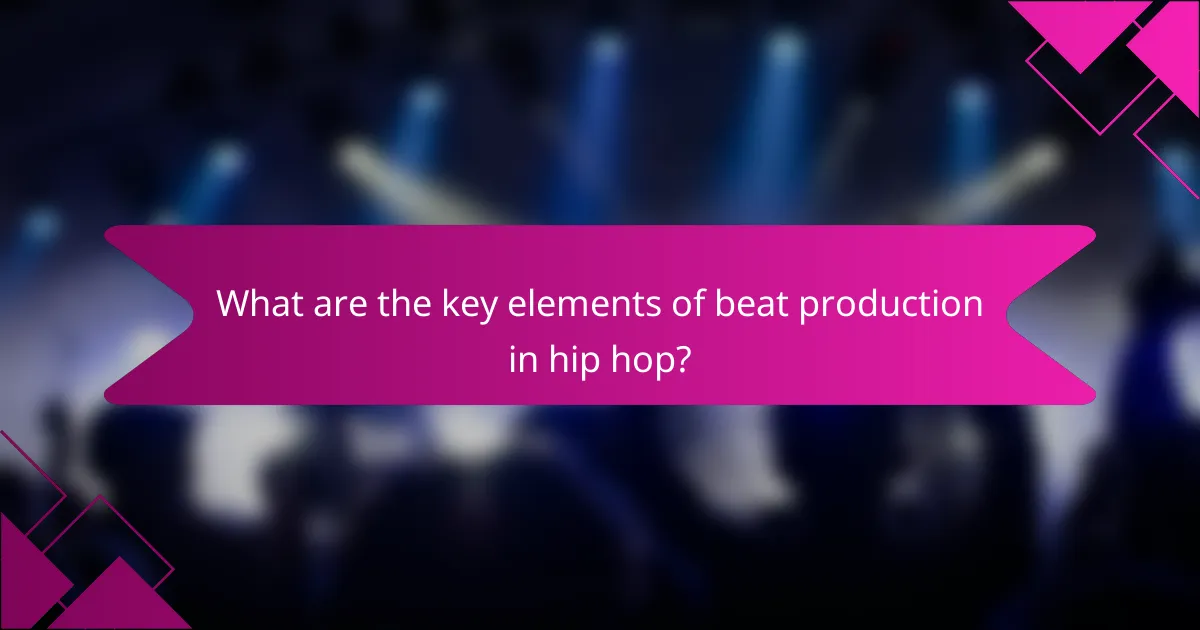
What are the key elements of beat production in hip hop?
Beat production in hip hop primarily involves creating rhythmic and melodic foundations that support lyrical content. Key elements include sampling techniques, drum programming, and the use of synthesizers, each contributing to the genre’s distinctive sound.
Sampling techniques
Sampling is the practice of taking snippets from existing recordings to create new music. Producers often select memorable hooks or beats from various genres, transforming them into fresh compositions. It’s crucial to ensure that samples are cleared for legal use to avoid copyright issues.
Common sources for samples include classic funk, soul, and jazz tracks, which can add depth and nostalgia to hip hop beats. Producers might layer multiple samples to create a rich soundscape, enhancing the overall texture of the track.
Drum programming
Drum programming involves creating rhythmic patterns using drum machines or software. Producers typically focus on kick, snare, and hi-hat placements to establish a solid groove. A common approach is to use a four-on-the-floor kick pattern, complemented by syncopated snares and hi-hats for complexity.
Experimenting with different tempos, usually ranging from 70 to 100 BPM for hip hop, can significantly impact the energy of the track. Additionally, varying the velocity of drum hits can create a more human feel, making the beat less mechanical.
Use of synthesizers
Synthesizers add melodic and harmonic elements to hip hop beats, allowing producers to create unique sounds. They can generate bass lines, pads, and leads that enhance the overall production. Analog synthesizers are often favored for their warmth, while digital synths offer a broader range of sounds.
Producers should consider layering synthesizer sounds with samples or live instruments to create a fuller mix. Using effects like reverb and delay can further enrich the sound, making it more immersive for listeners.
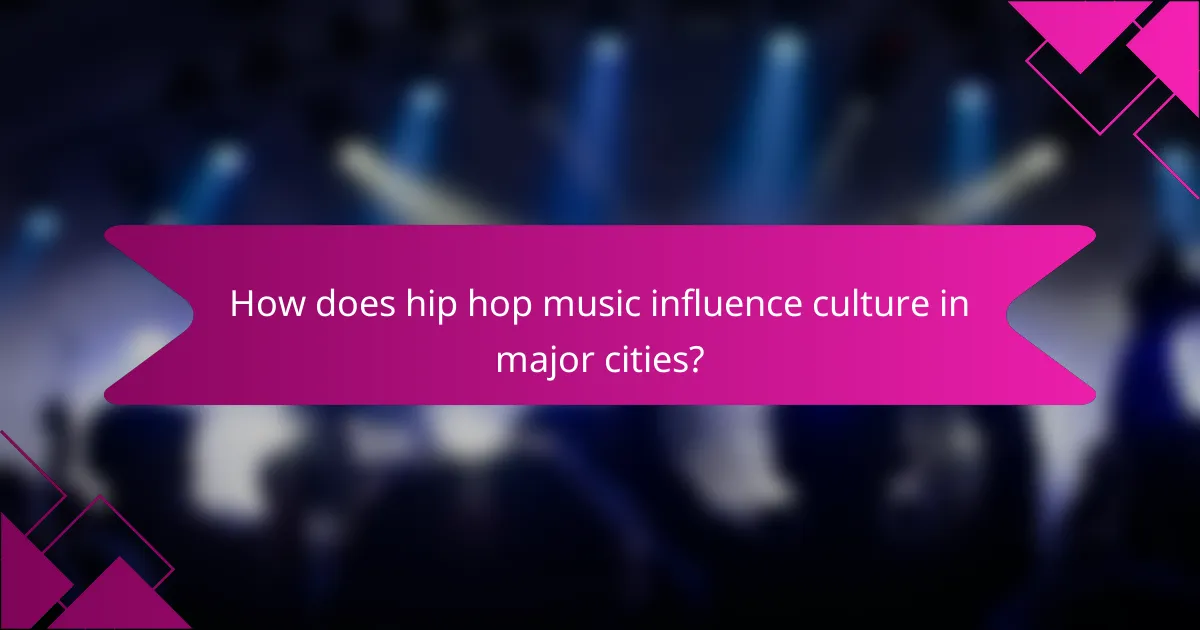
How does hip hop music influence culture in major cities?
Hip hop music significantly shapes culture in major cities by influencing fashion, social movements, and language. Its impact is evident in urban lifestyles, where hip hop serves as a voice for communities and a catalyst for change.
Fashion trends in urban areas
Hip hop music has a profound effect on fashion trends in urban areas, often dictating styles that resonate with youth culture. Baggy jeans, oversized shirts, and branded sneakers are staples that originated from hip hop artists and their communities.
Moreover, collaborations between hip hop artists and fashion brands have created iconic collections that reflect the genre’s influence. For instance, limited-edition sneaker releases often sell out quickly, showcasing the demand driven by hip hop culture.
Social movements and activism
Hip hop music plays a crucial role in social movements and activism, often addressing issues like racial inequality, police brutality, and economic disparity. Artists use their platforms to raise awareness and mobilize communities, making music a powerful tool for change.
For example, songs like “Fight the Power” by Public Enemy and “Alright” by Kendrick Lamar have become anthems for movements such as Black Lives Matter, illustrating how hip hop can inspire collective action and social justice initiatives.
Language and slang evolution
The evolution of language and slang in urban areas is heavily influenced by hip hop music, which introduces new terms and phrases that often reflect the experiences of marginalized communities. This linguistic innovation can spread quickly, impacting everyday communication beyond the genre.
Words and phrases popularized by hip hop artists frequently enter mainstream culture, shaping how language is used in various contexts. For instance, terms like “lit” and “flex” have become commonplace in everyday conversations, demonstrating hip hop’s role in evolving language trends.
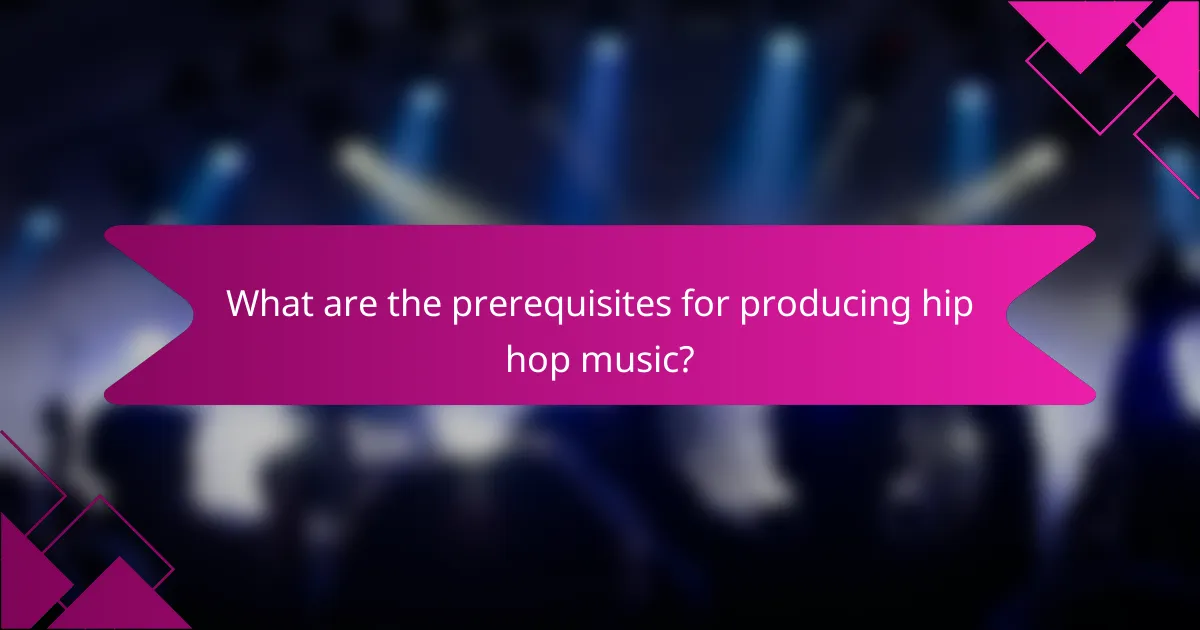
What are the prerequisites for producing hip hop music?
Producing hip hop music requires a solid understanding of music theory, familiarity with the genre’s history, and access to the right production tools. These elements are essential for creating authentic and impactful tracks that resonate with listeners.
Understanding music theory
A foundational grasp of music theory is crucial for hip hop producers. This includes knowledge of scales, chords, and rhythm patterns, which help in crafting melodies and harmonies that complement beats. Familiarity with song structure, such as verses, choruses, and bridges, is also important for effective storytelling in lyrics.
Producers should focus on learning basic concepts like time signatures and tempo, as hip hop often features varied rhythms. Understanding how to manipulate these elements can enhance the overall feel of a track and make it more engaging.
Familiarity with hip hop history
Knowing the history of hip hop is vital for any producer looking to create authentic music. This includes understanding the genre’s origins, key artists, and influential movements. Familiarity with landmark albums and classic tracks can inspire creativity and inform production choices.
Producers should explore various sub-genres, such as East Coast, West Coast, and Southern hip hop, to appreciate their unique characteristics. This knowledge can help in developing a distinctive sound that pays homage to the genre’s roots while pushing creative boundaries.
Access to production tools
Having the right production tools is essential for creating hip hop music. This includes digital audio workstations (DAWs) like Ableton Live, FL Studio, or Logic Pro, which provide the necessary environment for composing, recording, and mixing tracks. Additionally, a good set of headphones or studio monitors is important for accurate sound representation.
Producers should also consider investing in virtual instruments and sample packs that cater to hip hop styles. These tools can provide a wide range of sounds, from classic drum machines to contemporary synths, allowing for greater creativity in beat production.
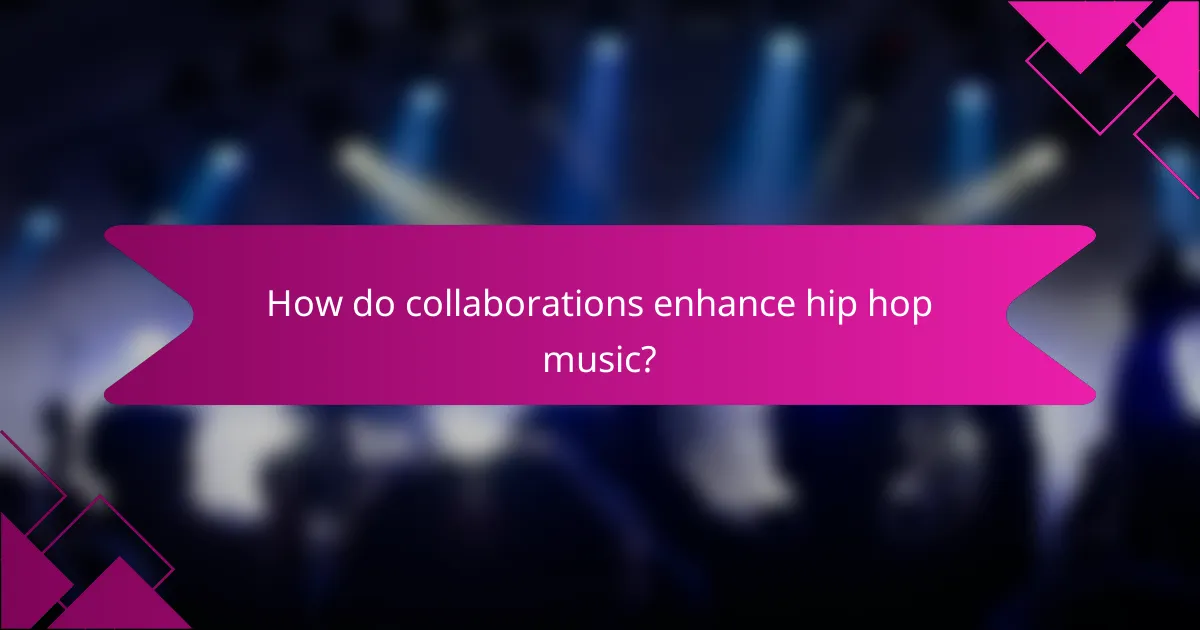
How do collaborations enhance hip hop music?
Collaborations in hip hop music significantly enhance the genre by blending diverse styles and perspectives, leading to richer lyrical storytelling and innovative beat production. These partnerships not only create unique sounds but also foster cultural exchange and broaden the genre’s appeal.
Cross-genre influences
Collaborations often bring together artists from different musical backgrounds, resulting in cross-genre influences that can redefine hip hop. For instance, a hip hop artist might collaborate with a rock musician, incorporating electric guitar riffs or live instrumentation, which can attract fans from both genres.
This blending of styles can lead to innovative tracks that push the boundaries of traditional hip hop, making it more accessible to a wider audience. Examples include the fusion of hip hop with jazz, funk, or electronic music, showcasing how diverse influences can create fresh soundscapes.
Expanding audience reach
Collaborating with artists from various genres or regions can significantly expand an artist’s audience reach. When a hip hop artist teams up with a pop star or a country musician, they tap into those artists’ fan bases, increasing their visibility and potential for new listeners.
This strategy is particularly effective in today’s digital landscape, where social media and streaming platforms allow for rapid sharing and discovery. Collaborations can lead to viral hits that resonate with a broader demographic, enhancing the overall impact of the music.
Creative synergy among artists
Collaborations foster creative synergy, allowing artists to share ideas, techniques, and experiences. This exchange can lead to innovative lyrical content and unique production techniques that might not emerge in solo projects.
When artists collaborate, they often challenge each other to elevate their craft, resulting in tracks that showcase the best of both contributors. This synergy can create memorable music that stands out in the crowded hip hop landscape, driving both critical and commercial success.
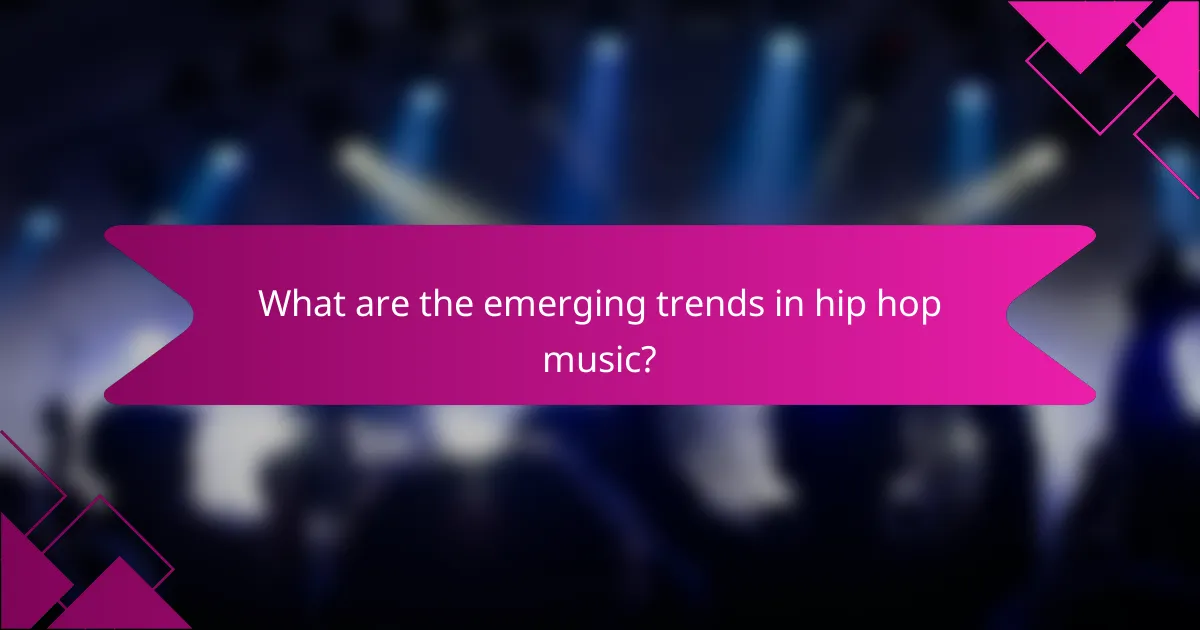
What are the emerging trends in hip hop music?
Emerging trends in hip hop music include the integration of advanced technology in production and the globalization of hip hop sounds. These trends are reshaping the genre, making it more accessible and diverse.
Integration of technology in production
The integration of technology in hip hop production has revolutionized how artists create music. Digital audio workstations (DAWs) like Ableton Live and FL Studio allow producers to experiment with sounds and beats more easily than ever. This shift has led to a rise in home studios, enabling aspiring artists to produce high-quality tracks without the need for expensive studio time.
Additionally, the use of artificial intelligence (AI) in music creation is becoming more prevalent. AI tools can analyze existing tracks to suggest new melodies or beats, streamlining the creative process. However, artists should remain cautious about over-relying on technology, as it can sometimes lead to a loss of originality.
Globalization of hip hop sounds
The globalization of hip hop sounds reflects the genre’s increasing influence across different cultures. Artists from various countries are blending traditional musical elements with hip hop, creating unique subgenres. For example, Latin trap combines reggaeton rhythms with hip hop beats, while Afrobeat-infused hip hop showcases African musical styles.
This trend not only broadens the appeal of hip hop but also fosters collaboration among artists worldwide. However, it is essential for artists to respect and authentically represent the cultures they draw from, avoiding cultural appropriation. Engaging with local communities and understanding their musical heritage can enhance the authenticity of cross-cultural collaborations.
